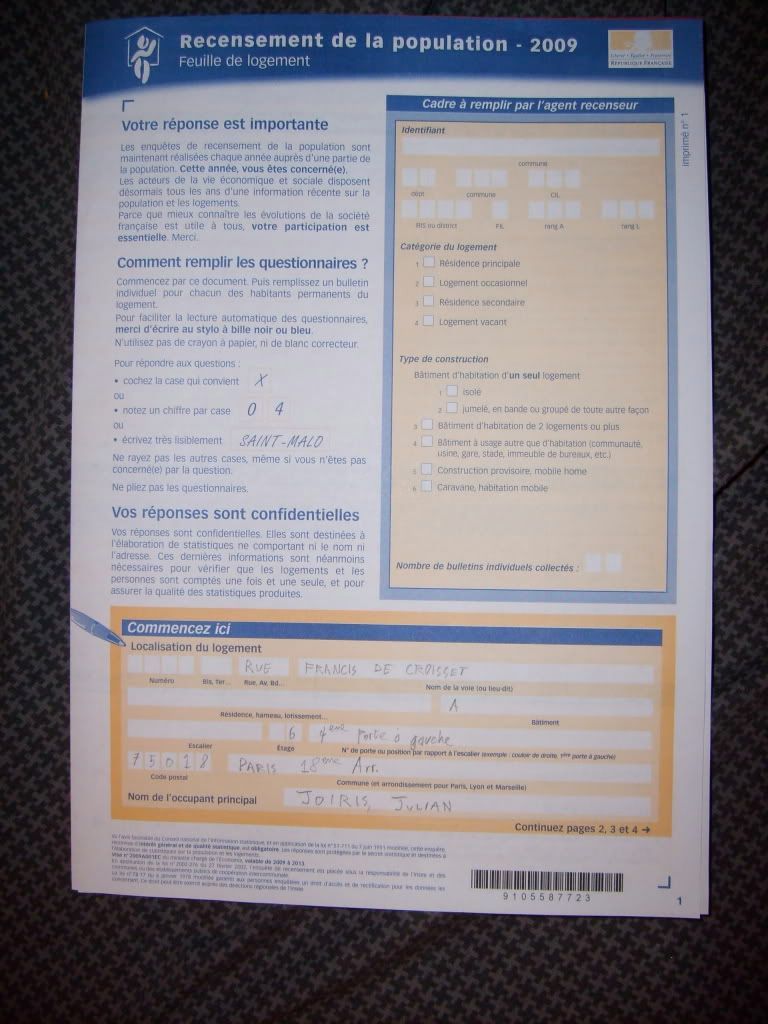Survey, Tea, and other Thrilling Things … oh, and a rant, apparently
Sometime last week this lovely little bit of paper appeared in my dorm mailbox (seen below in initial stages of filling-out):

It’s an Official Survey of some sort or other on housing and employment and whatnot. It claimed to be mandatory, but I got the sense that by mandatory they meant “something we’d really prefer you did even though we have no way of enforcing this besides sending someone to knock on your door and remind you that you really ought to do it if you haven’t already.” I filled it out dutifully. A bit of a drag; some parts I could skip altogether, since they didn’t apply to students in university housing, but others necessitated looking-up of terms and finding out numbers of départements and communes and whatnot. I deployed every linguistic resource at my disposal:

(Left-to-Right: clipboard, assorted bits of survey, Petit Robert, Oxford/Hachette, pencil, socks)
Yeah, okay, so it wasn’t actually that exciting. At any rate, I did my civic duty. Noted that the form was clearly supposed to be inputted into a database by hand, rather than scanned. I suppose French people really have a hard time letting go of good old-fashioned hard-copy bureaucracy.
On another note, I tried making tea this weekend, and for some reason whenever I boiled it in my pot it developed an oily scum on top. This was frustrating. I had to instead fill an empty soda bottle with hot water, add teabag, and heat on the kitchenette lamp:

And as for the other Thrilling Things that have been going on…
Actually, I lied. Nothing remotely thrilling has happened. Survey and tea is about it. There’s rumor that the school might or might not be completely closed tomorrow. Naturally nobody can tell us for sure. The whole strike thing is getting, frankly, annoying. Nothing against it really on principle. It’s actually nice to think that them young French student-types are all so politically engaged and such. Except when you realize how ineffectual it is. The problem is that any sort of people-mobilizing tactic designed to pressure a government into taking action will, after a few decades, lose most of its original impact. The first time you take to the streets, break out the picket signs, hold a sit-in, refuse to work, stop using buses, whatever, the people in charge aren’t entirely sure what to make of it, and you get all sorts of fun publicity. Then the novelty wears off, and all these things boil down, largely, to fancy ways of getting heads counted that show slightly more dedication than it takes to, say, sign a petition or phone your senator/MP/whatever. The symbolic impact and surprise value are gone; all that’s left are the bare bones of the action–the actual revenue lost to a boycott or a strike, the disruption caused by a sit-in/lie-in/whatever-in, so forth. Governments are not stupid, and they learn to deal with these things is such a manner as to cause minimal disruption.
Ergo the problem with a society where going on strike is such a knee-jerk reaction. Whereas Americans would probably start out with a strongly-worded petition (which would be ignored), then escalate to press conferences (mostly ignored) and generic signs-in-the-street protests (mostly ignored) and then great big marches on important places (still pretty easy to ignore at this point), French people start by going on strike, and are ignored by the French government, because said government is completely desensitized to the idea of people on strike. The public is used to it, the media is used to it, everybody is used to it. What this means is that, when they realize that they are being ignored (quelle surprise!), our wonderfully politically active French studentry has very little means left at its disposal to escalate the conflict. The severity of the strike can be increased only by a matter of (relatively little) degree. This has all the strategic flexibility and finesse of a game of chicken. It’s just a matter of both sides waiting for the other one to get tired and give up. It becomes, basically, a war of attrition.
And the annoying part, of course, is that those lovely students seem utterly oblivious to this. Their attitude, if anything, is self-contradictory. They seem to think that they should be admired for being more politically active than their counterparts elsewhere, and that they should be admired for belonging to a culture where such tactics are the default way of expressing political opinions. I suppose they can be admired for their willingness to inconvenience themselves for their cause, but the idea that there’s an inherent nobility in the willingness to go all-out at the drop of a hat– that’s frankly bewildering. I don’t suppose that this strategy is less effective than student movements in other places, and it gets points for a high level of cohesion and relative coordination (which is admittedly an easier task in France than in, say, the US, simply because the US has so many more people to coordinate).
But the students here lose points for originality, which is a significant asset in any attempt at effecting social change that doesn’t wish to resort to violence. Frankly, it seems clear to me that the next generation of social activism is going to be largely internet-based, at least in its high-level coordination and information dissemination efforts; France is going to fall behind quickly if in ten years they’re still handing out leaflets in lobbies. Of course, it would help if the infrastructure was there; French universities don’t even seem to give out student email addresses, or even collect students’ existing addresses to put together mailing lists. The mentality seems to be that if you want information, it’s your responsibility to seek it out. This might have been acceptable 20 years ago, but now there is simply too much information out there to expect people to put up with navigating whatever convoluted, semi-coordinated systems are in place. What it amounts to, in the case of the strike, is a bunch of people making a lot of noise that most of the world doesn’t hear. If they were really dedicated to effectiveness in their efforts, they would at least take the initiative to set up websites or — if even that’s too difficult — Facebook groups and Youtube channels.
Okay, I didn’t expect to go on a rant that long. Just frustrated, I suppose, because all of this really should be self-evident. It really seems, sometimes, as though French academia is still living in the 20th century. At the very least, their internet is firmly entrenched in web 1.0. It’s a place to put stuff, not a truly fluid and interactive information-sharing network. The US, certainly, has a certain amount of institutional inertia in this regard, but at least the universities there are making progress, however slow. Ending rant now. That is all.
